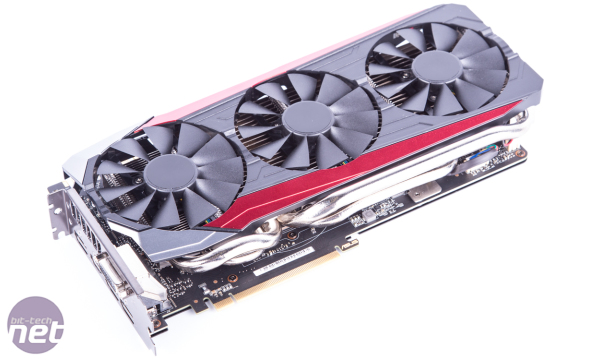Performance Analysis
Performance of the Asus GTX 980 Ti Strix is the absolute fastest we've witnessed for a single GPU graphics card due to the significant factory overclock applied out of the box. This particular Asus variant is 11.8, 13.1 and 15.6 percent faster than the reference Nvidia GTX 980 Ti at 1080p, 1440p and 2160p, respectively, in terms of average frame rates. Compared to AMD's R9 Fury X this Asus graphics card is 29.9, 23.3 and 19.1 percent faster across the same set of resolutions; impressive numbers indeed.
In comparison to MSI's GTX 980 Ti Gaming 6G the Asus Strix variant is approximately 3 to 5 percent faster depending on the title at hand. One area where the Asus GTX 980 Ti Strix stands out is in the field of power consumption. Peak power draw was 474W, 52W more than the reference design, understandable given the dramatic increase in frequency, and 47W less than MSI's lower-clocked equivalent. Such impressive numbers appear to be testament to the efficiency of the new Asus Super Alloy II VRM package. For reference, typical power consumption under heavy 3D load varied between 440 and 460W.

The Asus DC3 cooler delivered a well-balanced set of results; the temperatures hovered around the 80 degrees Celsius level with a fan speed that barely reached 40 percent, meaning the graphics card was totally inaudible over other system components. Asus could set a more aggressive fan profile to deliver better results than the competition but the focus with the Strix card is on silent gaming and an 80 degrees Celsius target is low enough to ensure the maximum GPU boost speed is consistently maintained.
Conclusion
With GTX 980 Ti graphics cards in such short supply at present it is understandable that prices, particularly on custom models, have risen considerably to reflect the high-demand short-supply situation. The Asus GTX 980 Ti Strix is one of those particular models that is in high-demand, especially here in the UK, and that is reflected with a hefty retail price of £640. GTX 980 Ti graphics cards in general start at around £520 but more premium models, such as EVGA's GTX 980 Ti Classified, are retailing for as much as £620.Asus is openly targeting the premium end of the GTX 980 Ti market seeing its main competition as the likes of the EVGA GTX 980 Ti Classified or Zotac AMP! Extreme, rather than more affordable models from Palit and MSI. As such, the extra premium demanded by Asus over other GTX 980 Ti graphics cards could be seen as something of a non-issue when prospective buyers were already happy to spend such a significant amount of money on a graphics card in the first place.

Asus believes that if gamers want the best GTX 980 Ti on the market then its Strix variant delivers that. Assessing the complete package - the gaming performance numbers, overall build quality and effectiveness of the DirectCU III cooling solution - leads us to the conclusion that it would be hard to argue with that sentiment; the Asus GTX 980 Ti Strix is one of the strongest graphics cards on the market. That said the premium-quality components used and the obsessive attention to detail in terms of the design do come with a significant price jump over rival offerings. As such, many value-minded gamers would still be better off considering cheaper options in order to maximise that bang-for-buck metric.

-
Performance39 / 40
-
Features28 / 30
-
Value18 / 30


MSI MPG Velox 100R Chassis Review
October 14 2021 | 15:04









Want to comment? Please log in.